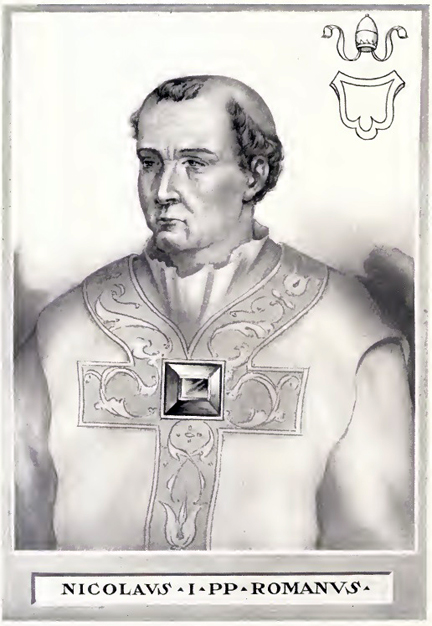 |
| Pope Nicholas I |
Nicholas I was the second pope known as “the Great” (the first was Leo the Great). Nicholas was the son of a Roman nobleman and received a classical education as a youth. He entered the clerical service as a young man and was ordained a deacon by Pope Leo IV (847–855). Under the influence of Emperor Louis II, Nicholas was elected pope on April 24, 855.
Ninth-century Christianity was fragmented. Bishops sought worldly power in their particular dioceses and ignored the decrees of the Roman pontiff. Previous popes had weakened the office of the papacy, and the primacy of the pope over other bishops had also been weakened.
Nicholas changed this, in part, by his treatment of Archbishop John of Ravenna. John battled with the pope over lands controlled by the papacy. He imprisoned priests who disagreed with his policies and bullied his bishops.
  |
John mistreated the diplomatic representatives of the popes, who sought to bring him to justice at the papal tribunal. Pope Nicholas excommunicated John because of his refusal to come before the tribunal. John reconciled, and then was excommunicated again for his dealings with other excommunicated archbishops.
The episode with Archbishop John of Ravenna and another with Archbishop Hincmar of Reims solidified the primacy of the papacy in matters attaining to the role of the pope in the hierarchy of the church and his control over his bishops. Hincmar opposed the right of appeal to the pope in matters of ecclesiastical succession but eventually recognized this legal power of the papacy.
Nicholas also strengthened the authority of the papacy over the marriage laws of the church. Lothair II of Lorraine had left his wife to marry another woman. At the Synod of Aachen in 862, the bishops of Lorraine approved of the conduct of Lothair.
Another synod, held in Metz in 863, condemned Lothair for abandoning his lawful wife. Pope Nicholas, aware of the conflicting decisions of the two synods, brought the archbishops who certified the two decisions before him.
The disagreement led to excommunication for both archbishops and intervention of Emperor Louis II, who imprisoned Nicholas in St. Peter’s Basilica for two days. Nicholas worked hard to reconcile Lothair and his wife, to no avail.
Perhaps Pope Nicholas’s greatest legacy to history was his establishment of primacy over the patriarchs of Constantinople and the church of the East. Patriarch Ignatius was deposed in 857 in violation of ecclesiastical law. He excommunicated Ignatius’s unlawful successor, Photius, and led the bishops of the East to reconcile with Ignatius.
The eastern bishops thus legally accepted that the pope was “first among equals.” Papal primacy in church doctrine was solidified in Nicholas’s famous letter Responsa Nicolai ad consulta Bulgarorum. Greek missionaries had recently converted Bulgaria.
Bulgaria’s ruler Prince Boris appealed to the pope in 863 to answer 106 questions on the teachings of the church. Nicholas answered the questions and, as some of his predecessors, set the trend for doctrinal questions to be answered by the pope, not by local bishops and clergy.